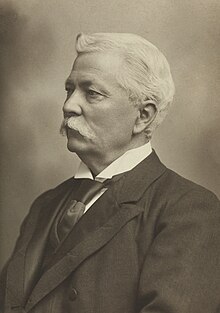
Back Henry Morton Stanley Afrikaans هنري مورتون ستانلي Arabic هنرى مورتون ستانلى ARZ Henry Morton Stanley AST Henry Morton Stanley AVK Генры Мортан Стэнлі Byelorussian Хенри Мортън Стенли Bulgarian Henry Morton Stanley Breton Henry Morton Stanley Catalan Henry Morton Stanley Czech
Sir Henry Morton Stanley | |
|---|---|
 | |
| Born | John Rowlands 28 January 1841 Denbigh, Wales |
| Died | 10 May 1904 (aged 63) Westminster, London, England |
| Burial place | Pirbright, Surrey, England |
| Citizenship |
|
| Political party | Liberal Unionist |
| Spouse | |
| Awards | Vega Medal (1883) |
| Member of Parliament for Lambeth North | |
| In office 15 July 1895 – 17 September 1900 | |
| Preceded by | Francis Coldwells |
| Succeeded by | Frederick William Horner |
| Military service | |
| Allegiance |
|
| Service |
|
| Years of service |
|
| Rank |
|
| Unit | |
| Battles / wars |
|
| Signature | |
Sir Henry Morton Stanley GCB (born John Rowlands; 28 January 1841 – 10 May 1904) was a Welsh-American[1][2][a] explorer, journalist, soldier, colonial administrator, author, and politician famous for his exploration of Central Africa and search for missionary and explorer David Livingstone. Besides his discovery of Livingstone, he is mainly known for his search for the sources of the Nile and Congo rivers, the work he undertook as an agent of King Leopold II of the Belgians that enabled the occupation of the Congo Basin region, and his command of the Emin Pasha Relief Expedition. He was knighted in 1897, and served in Parliament as a Liberal Unionist member for Lambeth North from 1895 to 1900.
More than a century after his death, Stanley's legacy remains the subject of enduring controversy. Although he personally had high regard for many of the native African people who accompanied him on his expeditions,[3]: 10–11 the exaggerated accounts of corporal punishment and brutality in his books fostered a public reputation as a hard-driving, cruel leader,[3]: 201–202 in contrast to the supposedly more humanitarian Livingstone.[3]: 472 His contemporary image in Britain also suffered from the inaccurate perception that he was American. In the 20th century, his reputation was also seriously damaged by his role in establishing the Congo Free State for King Leopold II.[4][3]: 7 Nevertheless, he is recognised for his important contributions to Western knowledge of the geography of Central Africa and for his resolute opposition to the slave trade in East Africa.[3]: 16, 474
- ^ "Henry Stanley (1841–1904)". bbc.co.uk. Retrieved 21 October 2014.
- ^ "Sir Henry Morton Stanley". britannica.com. Retrieved 21 October 2016.
- ^ a b c d e f g Cite error: The named reference
jeal2007was invoked but never defined (see the help page). - ^ Rushby, Kevin (24 March 2007). "A plinth for the fallen idol". The Guardian.
And in recent times, Stanley's reputation has only fallen further. Both Adam Hochschild's King Leopold's Ghost (1998) and Frank McLynn's two-volume biography (1989 and 1991) exposed the hard-hearted monster to pitiless scrutiny. Treaties made between Brussels and illiterate chiefs show Stanley as the architect of a shoddy robbery: vast swaths of Congo exchanged for bolts of cheap cloth and bottles of gin.
Cite error: There are <ref group=lower-alpha> tags or {{efn}} templates on this page, but the references will not show without a {{reflist|group=lower-alpha}} template or {{notelist}} template (see the help page).